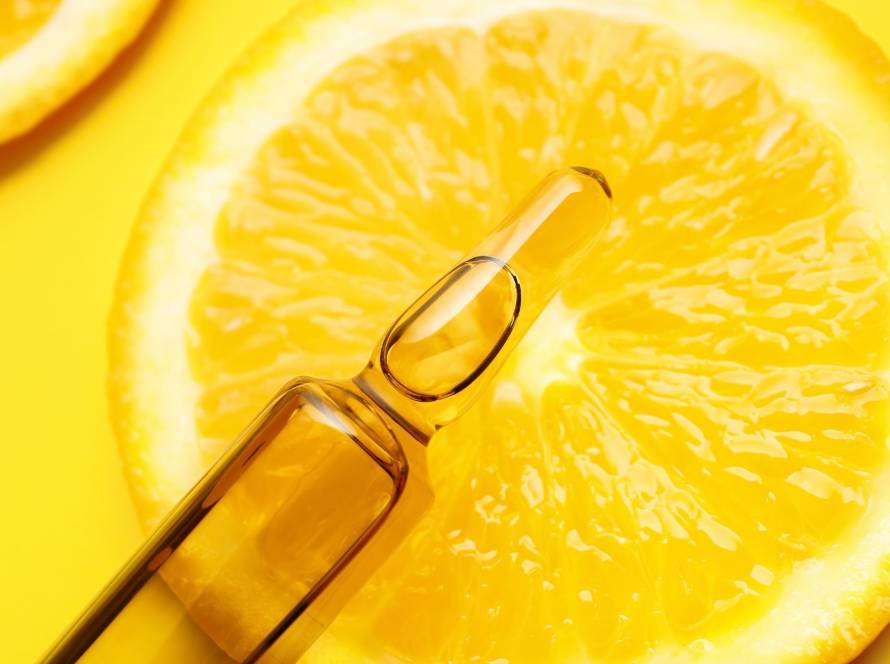Lutein is a yellow carotenoid found in plants and known for its antioxidant and anti-inflammatory properties. Widely recognized for its role in eye health, it also accumulates in the brain and skin, offering broader anti-aging benefits. Since the body cannot produce lutein, it must be obtained from the diet or supplements.
What is lutein?
Lutein belongs to the xanthophyll class of carotenoids and is closely related to zeaxanthin. These compounds are found in high concentrations in green leafy vegetables and certain fruits. It is fat soluble and is absorbed more efficiently when consumed with dietary fats.
Health benefits
Eye health and age related macular degeneration (AMD)
Lutein accumulates in the macula, where it filters harmful blue light and protects against oxidative damage. Research showed that supplementation with lutein and zeaxanthin reduced the risk of progression to advanced AMD by up to 25% in high-risk individuals.
Cognitive function
This carotenoid is found in the prefrontal cortex and hippocampus, areas linked to memory and learning. A study showed that higher lutein levels in older adults were associated with better cognitive performance, including memory and processing speed.
Skin protection
Due to its antioxidant capacity, lutein may reduce UV-induced skin damage. A randomized trial found that 12 weeks of oral lutein supplementation improved skin hydration, elasticity and lipid content.
Cardiovascular and cellular support
Lutein helps reduce oxidative stress and systemic inflammation, which are central to the aging process and chronic disease. Observational data linked higher blood levels of lutein with lower markers of inflammation and arterial stiffness.
Best food sources
Since the body cannot produce lutein, it must be obtained from dietary sources. This carotenoid is especially abundant in green leafy vegetables, but can also be found in a variety of fruits, vegetables and animal based foods. Including a wide range of these in your daily meals can help you reach optimal intake for eye, brain and skin health.
Some of the top natural sources of it are:
- Spinach;
- Kale;
- Collard greens;
- Zucchini;
- Broccoli;
- Corn;
- Egg yolks (highly bioavailable form);
- Kiwi and grapes.
Tip for better absorption
Lutein is fat-soluble, so it’s best absorbed when consumed with healthy fats. Adding a drizzle of olive oil, some avocado or a handful of nuts to meals that contain lutein rich vegetables can boost the absorption.
A varied, colorful diet that regularly includes these foods can help us maintain healthy lutein levels, supporting long term vision and overall cellular health.
Lutein supplements
Lutein is widely available in supplement form, particularly in formulas targeting eye health and age related vision support. Most studies use daily doses between 6 and 20 mg of it. It is commonly combined with zeaxanthin, another carotenoid that works synergistically with lutein to protect the macula and filter harmful blue light. Together, they help maintain visual sharpness, contrast sensitivity and protect against oxidative damage in the retina.
To improve absorption, many supplements include micellized forms, phospholipid complexes, or are delivered in softgel capsules containing healthy fats (like olive oil or fish oil). Because lutein is a fat soluble compound, formulations that include oil based carriers can significantly enhance bioavailability.
Lutein supplements are generally safe and well tolerated, with no serious side effects reported at typical dosages. However, taking excessive doses over time is not recommended unless under medical supervision.
Who may benefit from this supplementation
While lutein can be obtained through a balanced, plant rich diet, certain individuals may benefit from supplementation to ensure optimal levels, especially when nutritional gaps or health concerns exist. These groups include:
- Individuals with low intake of fruits and vegetables: people who consume a diet low in colorful produce, especially dark leafy greens, orange/yellow vegetables and berries, are likely getting insufficient amounts of this carotenoid;
- People with early signs of macular degeneration: age related macular degeneration (AMD) is a leading cause of vision loss in older adults. Individuals in the early stages of AMD or those with a family history of retinal diseases, may benefit from lutein and zeaxanthin supplementation. These carotenoids help increase macular pigment density, which protects the retina from oxidative stress and blue light damage;
- Older adults experiencing cognitive decline: older adults experiencing mild memory lapses, reduced attention span or slower processing speed may benefit from lutein’s neuroprotective effects, especially when combined with a brain healthy lifestyle;
- Individuals with high screen exposure or sun exposure: it acts as a natural blue light filter, making it particularly useful for people who spend extended hours in front of screens, such as computers, smartphones and tablets. It can help reduce eye strain, glare sensitivity and protect retinal health over time.
Lutein offers a wide range of benefits that go beyond eye protection. From supporting cognitive function and healthy skin to reducing oxidative stress, this carotenoid plays a key role in promoting healthy aging. Whether through diet or supplements, increasing it intake can be a simple and effective step toward maintaining vitality as you age.


